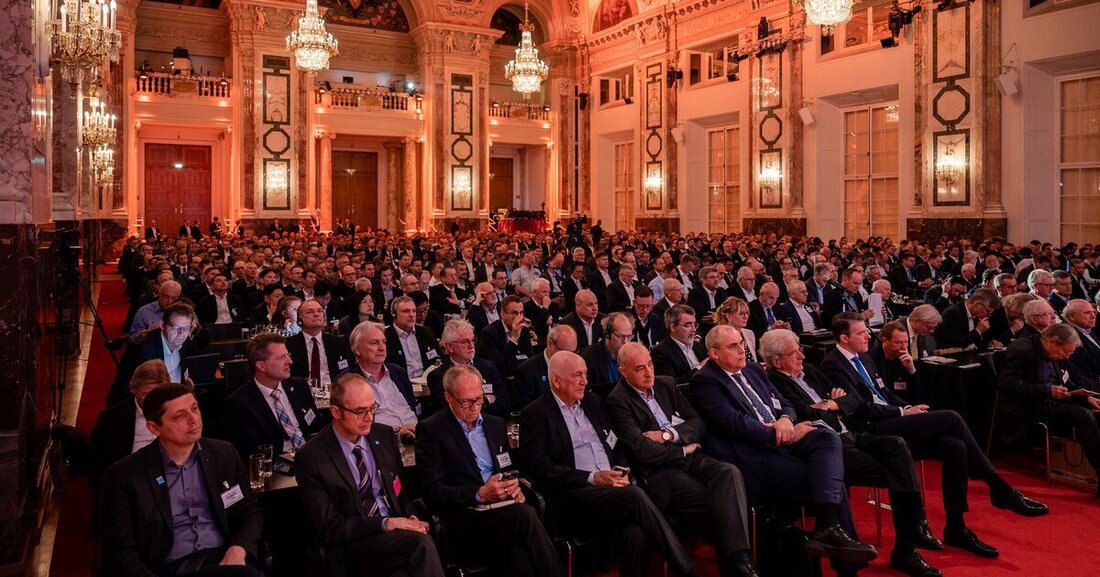Engine manufacturer: Commitment to climate protection
More than 80 presentations at the Vienna Motor Symposium showed new approaches to reducing greenhouse gas emissions.

Engine manufacturer: Commitment to climate protection
The automotive industry no longer wants to be the bogeyman of climate protectors, emphasized Bernhard Geringer, head of the Institute for Drivetrains and Vehicle Technology at the Vienna University of Technology, in his opening speech at the Vienna Motor Symposium. The fully booked event with more than 1,000 participants from all over the world took place from April 26th to 28th, 2023 in the Vienna Hofburg. In his presentation, Thomas Schmall, Chief Technology Officer at Volkswagen AG, showed Europe's enormous need to catch up when it comes to batteries, the most important and most expensive part of electric vehicles. Today, more than 95 percent of it comes from Asian manufacturers, who have also secured access to the most important raw materials such as lithium, nickel and cobalt. In Europe “we have to be careful that we catch up,” said Schmall. Not an easy task given the enormous subsidies for battery production in the USA and the low electricity costs in China, as Schmall showed. While the battery module costs per kilowatt hour are expected to be $127 in the USA and China in the future, they are expected to be $178 to $189 in Europe. Volkswagen is investing billions in setting up its own battery production including cell development. The first cell factory in Salzgitter, Germany, is scheduled to go into operation in 2025, and the next factory will be built in Valencia, Spain.
“The future is electric,” said Christoph Starzynski, Head of e-Drive Development and Electric Vehicle Architecture at Mercedes-Benz AG. All new developments at Mercedes from 2025 will have a purely electric drive, including the sports car subsidiary AMG. Starzynski: "We have a clear claim to leadership in electrification and digitalization. We want to be completely climate neutral by 2039." The Volkswagen Group also sees itself as a technological pioneer in electric mobility. In the future, all European electric models from Ford and electric cars from Mahindra will also be based on the company's own electric platform MEB.
“The even higher price of electric compared to diesel or gasoline versions means for us that there will be no battery-electric model for the time being,” said Seat Technology Director Werner Tietz. Seat customers would not accept the higher price for electric cars. In addition, “we cannot invest in electrification for two brands at the same time, so the focus is currently on Cupra.” Wayne Griffiths, chairman of Seat and Cupra, announced that the Cupra brand will be fully electric by 2030. Griffiths is critical of the new Euro7 emissions standard proposed by the EU. It brings a small gain for air quality, but makes combustion engines more expensive by around 2,000 euros. Small cars, the best-selling cars in Europe, could disappear from the market because of Euro7. Stefan Hartung, CEO of Robert Bosch GmbH, looked “confidently forward.” As one of the world's largest automotive suppliers, Hartung expressed his conviction in Vienna in a similar way to representatives of Asian car manufacturers: "The drive system will by no means be the same everywhere. The drives must correspond to the legal, economic and social framework conditions of the individual regions - and they must be affordable." While combustion engines will be practically banned for cars in the EU from 2035, they will continue to predominate in Brazil for a long time despite strict climate requirements, as Hartung showed in an overview. They just have to be operated with bioethanol. In US states like California, only new, emission-free vehicles will be allowed from 2035, but plug-in hybrids are also included there. Japan will require electrified new cars from 2035, but will also accept hybrid drives. China, which is considered a global pioneer of battery-electric mobility, also relies heavily on fuel cell and plug-in hybrid vehicles. The affordable price for environmentally friendly drives is particularly important in India, where, in addition to an upswing in new battery-electric vehicles, Hartung sees great potential for combustion engines with biofuels, gas and hydrogen in the passenger car and commercial vehicle sectors.
Hyundai wants to sell more than three million battery-electric vehicles and 500,000 fuel cell vehicles with Kia in 2030, said Sung Hwan Cho, CEO of Hyundai Mobis. Together with Bosch, Hyundai is also working on a hydrogen combustion engine for passenger cars. At Toyota, hybrid and plug-in hybrid technology will continue to play an important role in reducing CO2 emissions. By continuing to use inexpensive nickel metal hydride batteries alongside lithium-ion batteries, the purchase price should remain affordable. Toyota also wants to bring a solid-state battery to market in a hybrid car around 2025. Because of its high level of safety and energy density (doubling the range), it is considered a “miracle battery”. However, getting it ready for series production is proving more difficult than expected. Toyota is also working on the next generation of fuel cell technology. Toyota's 2030 sales target includes eight million electrified vehicles, including 3.5 million battery-electric vehicles. In addition, Toyota is developing combustion engines for hydrogen or CO2-neutral fuel such as bioethanol. In his closing speech, Helmut Eichlseder, head of the Institute for Thermodynamics and Sustainable Drive Systems at Graz University of Technology, saw “the provision of renewable energy” as crucial for all drives. Together with the necessary infrastructure, this is a “mammoth task”.

 Suche
Suche
 Mein Konto
Mein Konto